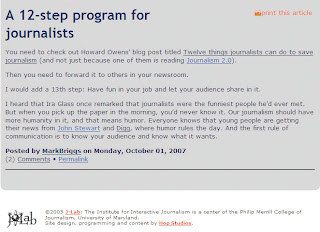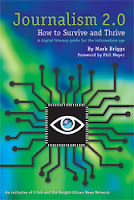Mallary Jean Tenore wrote a great article on Poynter Online called “Journalists Develop, Dismiss Digital Identities,” which offers several perspectives on the topic from journalism professionals, young and old. Click the link or image (linked from Poynter) to read the article.
I thought the timing was great because in the past few months I have been more actively working to shape my online identity. For instance, I became very aware of the concept of the “digital legacy” after attending an ethics session by Poynter’s Kelly McBride at UM, during which she discussed this topic in reference to journalists and people named in articles. Paul Conley‘s remarks as part of a resume-writing panel at the national ACP/CMA in Washington, D.C. also spurred me to reevaluate my presence on the Web.
“A digital identity is your presence on the Web — the sites and accounts you register for and create that help determine who you are and what you do online,” Mallory Jean Tenore explains in the the article.
Though my online identity is something I am proud of, I wanted to even better represent myself and demonstrate my Web-savyy. Some ways I have molded it are through buying my domain name using GoDaddy, creating this blog, posting comments on other blogs and creating a LinkedIn page.
Bottom line: Anyone going to journalism or in journalism should be very aware of their online identity and be proactive in establishing and shaping his/her online identity.
Weigh in: What do you think about having an online identity? Do you do anything to shape it?




